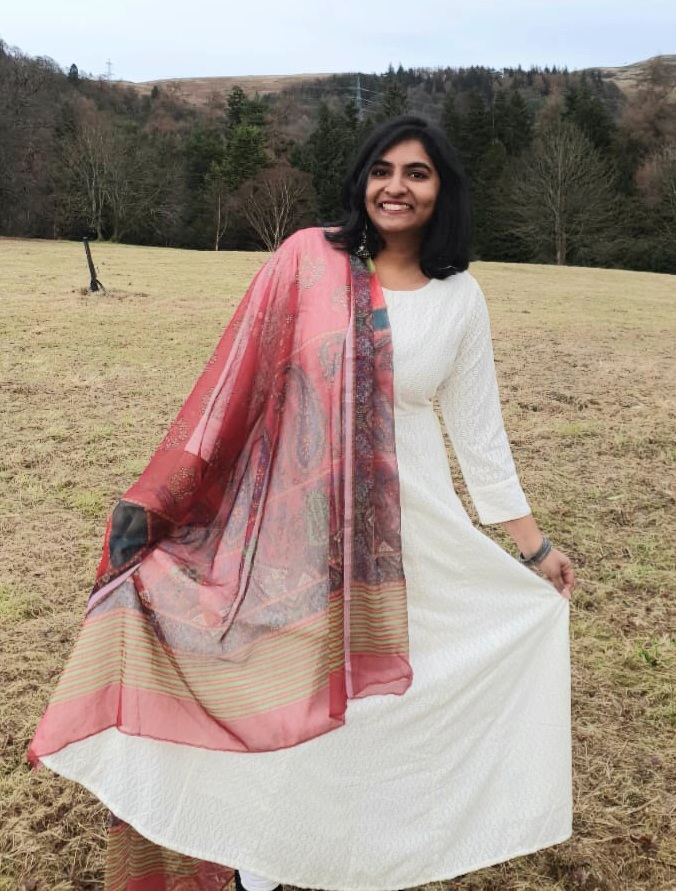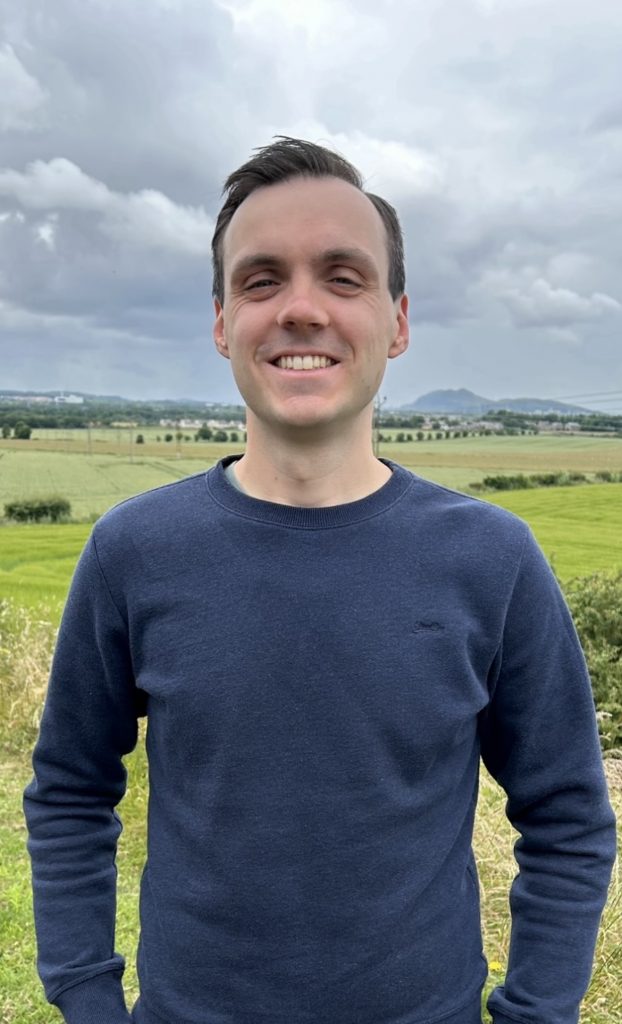Student Blogs
Read about the experiences of some of our recent students.
Adam Otto
University of Stirling
MSc Psychological Research Methods
Research Placement

As postgraduate student researchers in the Agency, Rationality, and Epistemic Defeat (ARED) project, we had the opportunity to attend the Glasgow Science Festival at the Botanic Gardens in Glasgow, Scotland. At this event, we were able to engage with the public about some of our research regarding human and animal minds.
For the past few months here at the University of Stirling, we have been conducting testing sessions with two-year olds to determine if they possess the ability to discriminate between reliable and unreliable sources of information. The ARED team is also partnered with the Messerli Research Institute in Vienna, Austria who conducted the same testing sessions with dogs and pigs. Together, we are interested in exploring the similarities and differences that humans and other species possess when making rational decisions.
At the Glasgow Science Festival, we interacted with individuals from a variety of ages, and invited them to reflect on how they view human and animal intelligence. Young children were given the opportunity to sort animal figurines based on whether they believed the animals were smart, learned from friends, or had feelings. They could also participate in drawing an animal thinking. Youth and adults had the opportunity to engage in a discussion about human and animal intelligence, pondering if certain species had distinct qualities that made them unique from others. The public had the opportunity to view videos of some of the testing sessions the ARED team had conducted with the children, pigs, and dogs. We also encouraged them to take part in a tablet task, which mimicked the testing sessions from our studies with the other populations.
Engaging with the public at the Glasgow Science Festival was a wonderful way to share the knowledge we have gleaned from our experiments. As postgraduate students, it was especially beneficial to practice converting research jargon into accessible language for people outside of the research community. It was fun to be able to share ideas about human and animal intelligence, and also to hear what the community thought about our research and intelligence in general. Overall, it was a great experience that helped remind us that the community and researchers should be partners in exploring scientific questions and theories.

Meghna De Souza
University of Stirling
MSc Psychology (conversion)
Research Placement
ARED is the first research project I have been a part of. Despite having no prior experience, I found it easy to learn and settle into the research process. Before we began testing, we had multiple training sessions in order to familiarise ourselves with the project. This helped me grasp the various aspects of data collection and I am appreciative of the time and space we were given to learn. The team was helpful and supportive, and it was nice to be part of a diverse group working together as one.
I have been part of the team collecting data for about 6 months now, and we began with testing two-year-old children. It was interesting to test if they revise their beliefs when presented with contradictory information. I was amazed by some of the children in these experiments and it showed me that 2-year-olds can understand and rationalize a lot more than I knew! These testing sessions taught me helpful ways to interact with children and recognise various stages of language and motor development. We have also tested adults with a similar experiment design to the one we had with the children. This gave us useful insight as we could compare a two-year old’s performance in the experiment to a grown adult.
We also participated in the Glasgow Science Festival in June at the Botanic Gardens. We had set up our tablets and computers and managed to conduct a few testing sessions and we also had a few questions put up that people could write their thoughts on. The questions were ones that the ARED project asks, such as “Is human intelligence superior and if yes, what makes it superior?” We had some very interesting conversations and answers to our questions with people in Glasgow enjoying a summer day out at the Gardens. The testing sessions at the festival gave us a chance to speak with the participants and understand how the study was perceived and how
participants made choices in the experiment. It also showed me the various views people have on human and animal minds.
More recently, we have been looking at ideas for a replication study that tests rationalization in non-verbal children. This has helped me understand the research process in greater detail, especially the thought process behind designing an appropriate experiment that tests what you wish to investigate, the trial and error in data collection and a little insight into planning for recruitment and participation. ARED has been a rich, stimulating experience and it has instilled deeper thoughts about human and animal intelligence. I believe that studying rationalization in both animals and children could contribute greatly to the scientific community and I am happy to have been a part of it. I look forward to reading the findings of this project. A big thank you to Dr Kirsten Blakey for her continued support and to my fellow students especially Brina, Rishika and Adam who I worked with the most for making this learning experience a fun one.
Rishika Ramanand
University of Stirling
MSc Psychology (conversion)
Dissertation & Research Placement

Agency, Rationality and Epistemic Defeat (ARED) is an interdisciplinary research project on epistemic agency and rationality supported by UKRI through the Future leader fellowship scheme. It is a collaboration between philosophy, cognitive developmental psychology, and cognitive ethology hosted by the University of Stirling and the Messerli Research Institute at the University of Veterinary Medicine in Vienna.
The project aims to explore the origins of human rational thought by comparing how infants, dogs, and pigs form and revise their beliefs. We had the opportunity to work with this project as our placement for our Masters programme. It was a wonderful few months of working with a great team and for something that I am passionate about.
We primarily focused on infants for this experiment, because we wanted to see if nonverbal children could reason rationally. The project began with training sessions, in which we were instructed how to perform the experiment, followed by testing sessions in January. It was observed during the testing session that youngsters, even at such a young age, comprehend cues and can discern between a credible and unreliable informant. Children learn at an early age, which helps them enhance their abilities and values later in life. We also had the opportunity to test individuals and see how reasonable they were in updating their ideas using a tablet exercise, which was similar to the tasks we conducted with the children. Certain actions were video coded after the testing sessions.
We were able to attend the Glasgow Science Festival which was held from June 1st to 11th with the same experiment which was an excellent opportunity to learn in an engaging, intriguing, and approachable environment. It was an excellent chance for us, as students, to learn and connect with the public while discussing our experiment. We were thankful that so many children and adults were interested in and participated in the experiment. It inspires people of all ages to learn more about science and to participate in discussions about the issues that scientists are working to solve. The festival gave me an opportunity to understand how, art serves as a crucial vehicle for bringing science to a wider audience.
Overall, this was a really rewarding experience for us since it allowed us to develop my abilities and teach us the value of teamwork. Personally, my experience while working in this experiment has made an impact on me and I would like to work on such similar projects in the future.
Lewis Fox
University of Stirling
MSc Psychology (conversion)
Research Placement

The ARED project investigates the origins of rational thought by comparing how children, dogs, and pigs revise their beliefs in light of reasons. To share our research, we participated in the Glasgow Science Festival at the Riverside Museum. To demonstrate how we study what children believe we had the audience take part in some Theory of Mind tasks. Theory of mind is the ability to understand that others have their own thoughts and perspectives, which children typically develop around age four.
At the festival, we illustrated this concept with the Sally-Anne task. Using puppets, we demonstrated that characters have separate perspectives. The puppets placed a rubber duck in a basket and then “left” the scene. The children, who saw the duck being moved to a different basket, were asked where the puppet would look for it upon returning. This tested the children’s understanding that the puppet, unlike them, would not know the duck had been moved.
Our stall was bustling with activity and attracted attendees of all ages. Besides the Sally-Anne task, we featured a game to explore visual versus verbal information processing. Children were presented with two boxes, one blue and one green, and were told that only one contained stickers. One child turned their back while the other was told the stickers were in the blue box. When the first child turned back, the second child was shown the stickers were actually in the green box. With both children facing forward, they were asked to decide which box they believed contained the stickers. This experiment tested the hypothesis that visual information (being shown) is more reliable than verbal information (being told), emphasizing that while verbal information can be deceptive, visual confirmation is harder to dispute. It also illustrated the Theory of Mind, suggesting that the child who had only been told about the stickers should understand the other child’s visual experience is more reliable, leading them to discuss their perspectives and conclude that seeing was more convincing.
We also presented a video showing pigs and dogs taking part in our study which engaged the interest of attendees. Questions like, “Do animals think like humans?” and “Are animals rational beings?” encouraged visitors to reflect on the cognitive abilities of different species and consider the parallels and distinctions between human and animal intelligence. Overall, interacting with the public and sharing our research at the festival was a rewarding experience, highlighting the importance of engaging the community in scientific exploration and understanding.
Atheer Alalawi
University of Stirling
MSc Autism Research
Research Placement
The ARED project is an interdisciplinary research initiative which investigates how infants, dogs, and pigs form and revise beliefs. Working with the ARED project has been an incredibly enriching experience, both personally and professionally. By immersing myself in the study of epistemic agency and rationality, I delved into a topic that was initially unfamiliar to me, gradually building my understanding through comprehensive reading. This journey expanded my intellectual horizons, allowing me to blend insights from cognitive developmental psychology, philosophy, and cognitive ethology.
Initially, entering the LifeSpan laboratory for the first time was one of the most pleasing moments. The lab was meticulously prepared and organized in a fun, child-friendly way, filled with toys, stories, colours, and dolls. This lively and engaging environment was specifically designed to attract and comfort children, making it a delightful place to work. The vibrant atmosphere of the lab added an element of joy to my daily activities, making the data collection process even more rewarding.
One of the most rewarding aspects of this project was my interaction with young children during our testing sessions. It was fascinating to observe how they process information and make decisions. In fact, engaging with these children highlighted the significant individual and developmental differences among them, which in turn taught me how to communicate effectively with young participants and provided practical insights into cognitive development at early ages.
Another valuable experience was learning about the various devices in the laboratory and understanding how they function particularly the eye-tracking device. I had often read about eye-tracking technology in research, but working with it firsthand provided a much richer understanding. This hands-on experience allowed me to see the potential applications of this technology in various research contexts, greatly enhancing my technical skills and appreciation for advanced research methodologies.
Furthermore, an unexpected yet valuable skill I developed was coding. By analyzing numerous recordings and videos, I learned to transform qualitative data into codes for later analysis. This process required meticulous attention to detail and the ability to synthesize complex information into structured data formats. I found that this skill will be incredibly beneficial in my future academic and research endeavours, providing a strong foundation for data management and analysis.
Ultimately, I must highlight the exceptional work team, who were pivotal to the success of my personal experience. They assisted me greatly in understanding new tasks, creating a comfortable and low-pressure work environment, and fostering a friendly environment that made the work feel far from routine. Instead, it was an ongoing learning experience full of new discoveries and professional growth.




